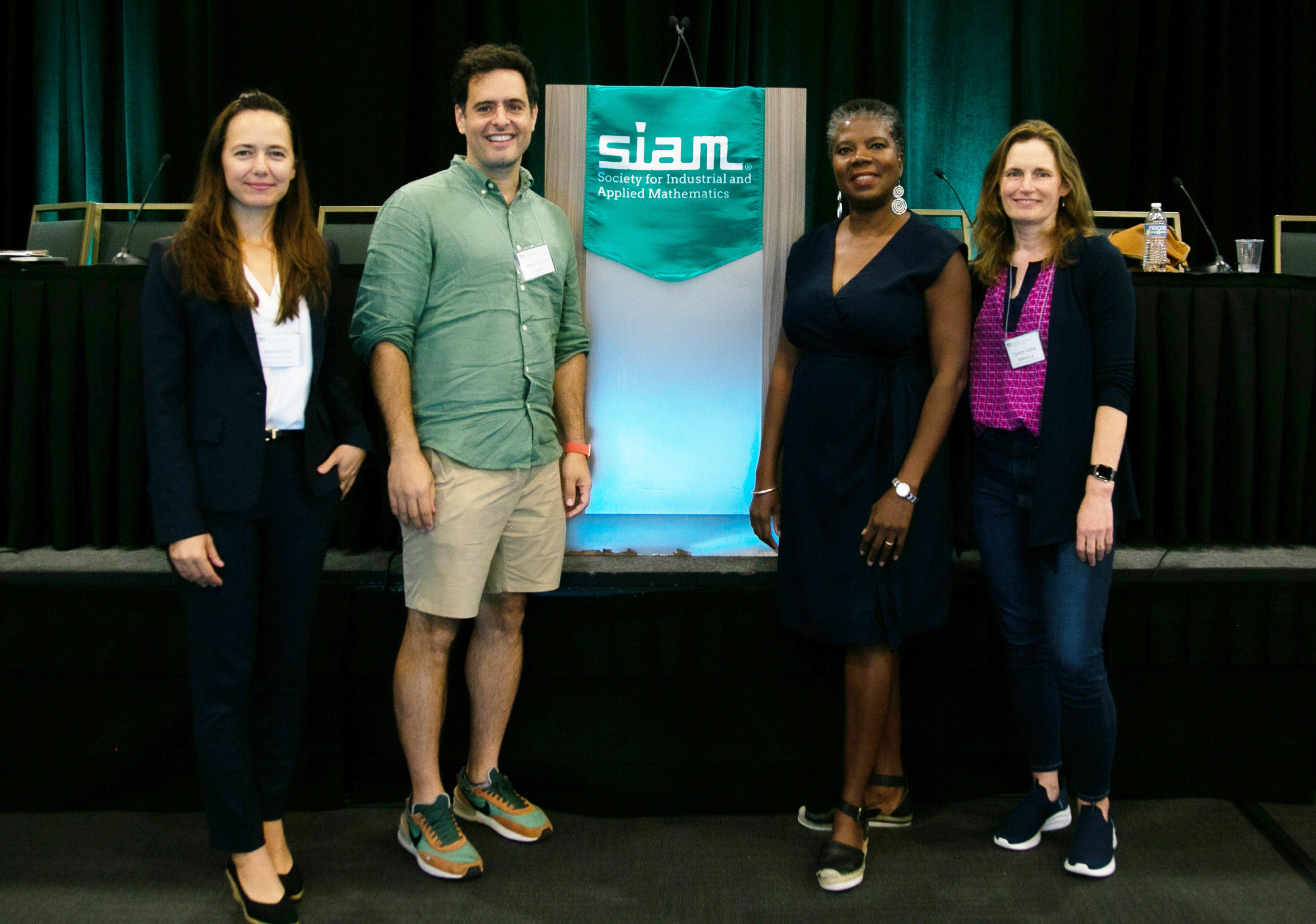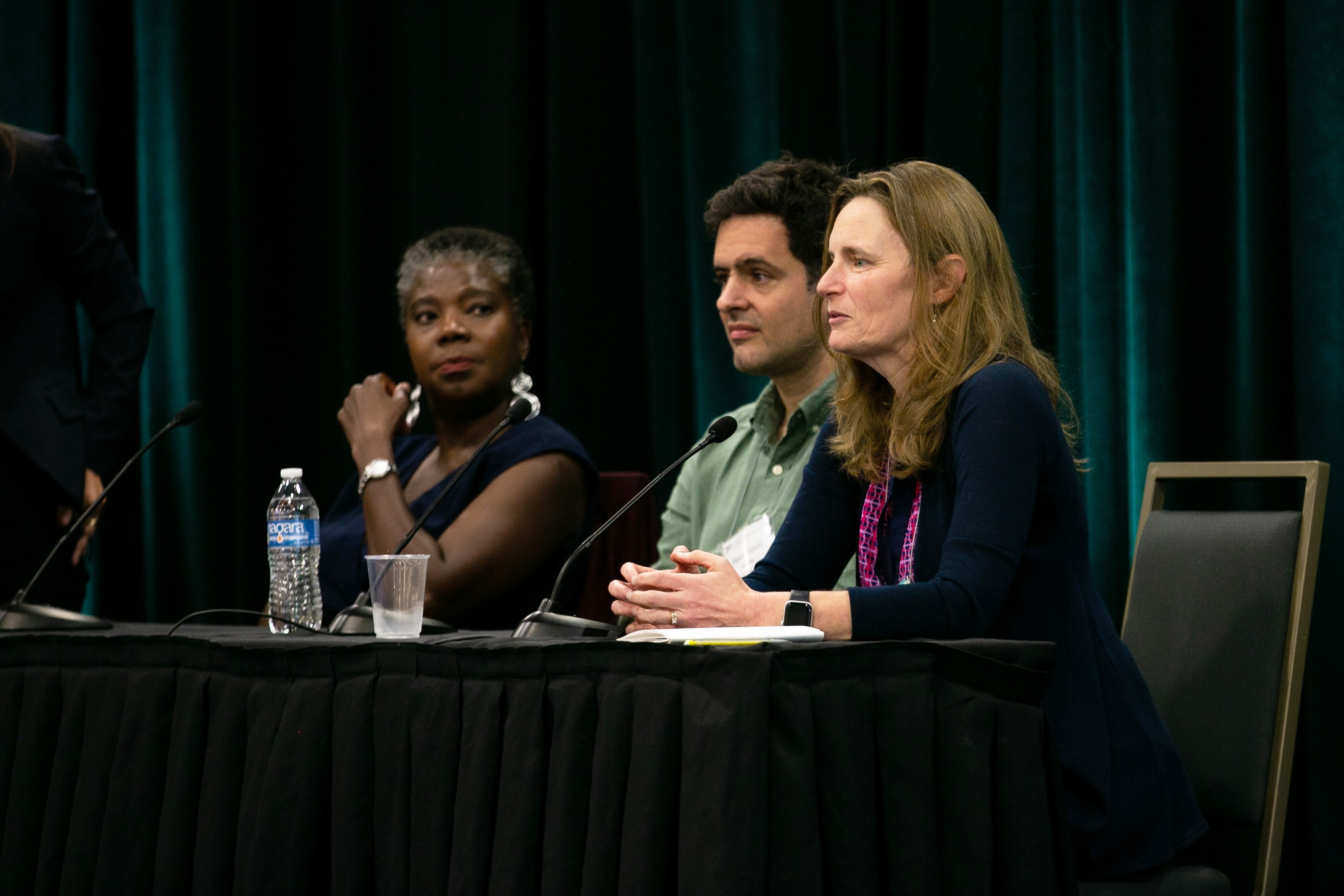Panel Discussion at MDS22 Prepares Students and Early-Career Researchers for the Workforce
As they prepare to enter the workforce, all students and early-career individuals—regardless of area of expertise—likely view the possible career paths, environments, and application areas that lie ahead with a mixture of trepidation and excitement. For instance, applied mathematics and computational science students might wonder how to establish and maintain mentored relationships; whether to pursue employment in academia or business, industry, and government; and how to ready themselves for job interviews. During a panel discussion at the 2022 SIAM Conference on Mathematics of Data Science—which took place in San Diego, Calif., in September—Marco Cuturi (Apple, Inc.), Tamara Kolda (MathSci.ai), and Suzanne Weekes (executive director of SIAM) shared their insights and experiences with a rapt audience of students and junior researchers. Noemi Petra (University of California, Merced) moderated the session, which was followed by a lunch that allowed attendees to network directly with the panelists and each other.
The panelists began by discussing their respective educational trajectories and career decisions. While working towards her Ph.D. in applied mathematics at the University of Maryland, College Park, Kolda conducted research on both optimization and latent semantic indexing (an early form of data science). Data science was not well known or even clearly defined at that point in time, so she initially focused much of her energy on optimization. The optimization portion of her thesis was significantly more complicated, but the data science aspects generated greater levels of enthusiasm among readers and collaborators. “It was intriguing to me that people were more excited about data science,” Kolda said. “I realized that it was not about how hard the math was, but more about whether it could solve cool problems.”

After earning her Ph.D., Kolda spent several years as a postdoctoral fellow at Oak Ridge National Laboratory. She then began a 20-year stint at Sandia National Laboratories before becoming an independent researcher and founding MathSci.ai, her consulting company, in 2021.
Cuturi obtained his Ph.D. from École des Mines de Paris in France. When he was in graduate school, his contemporaries seemed to either pursue Ph.D.s with the intention to enter academia, or seek direct employment in industry without earning a higher degree. “The landscape was much more binary than it is today,” Cuturi said, noting that researchers rarely moved between the two areas. Nowadays, however, a Ph.D. usually proves valuable regardless of one’s intended career path.
Cuturi bounced back and forth between academic and industry-based settings, pursuing opportunistic projects and research areas that appealed to him. “It was a bit of a risk back then, but it ended up being a good decision,” he said. “It’s very important to keep reinventing yourself and look for other topics.” He currently works in the Machine Learning Research Group at Apple but also retains a position at the Institut Polytechnique de Paris, where he teaches a reduced course load and supervises several Ph.D. students.
Prior to serving as SIAM’s executive director, Weekes spent two decades as a faculty member at Worcester Polytechnic Institute (WPI). She traced her interest in mathematics to her childhood in Trinidad and recounted the moment when her father brought home a computer, after which she learned to program. “I always enjoyed mathematics,” Weekes said. “Then I fell in love with logic and computing.” After graduating with a B.S. in mathematics and a minor in computer science from Indiana University Bloomington, she earned a Ph.D. in mathematics and scientific computing from the University of Michigan. As a professor at WPI, Weekes was particularly interested in bridging the gap between academia and industry. “That was my passion, so I’m glad to be in a job that connects the two,” she said.
Petra then asked the panelists about the various ways in which institutions measure success — a topic that is especially pertinent for faculty seeking tenure or industry employees working towards a promotion. Though factors like tenure, teaching, funding, customer impact, and personal relations all typically serve as assessments of success, Kolda cautioned that they are not necessarily the best quantifications of accomplishment. “You can look at those metrics, but I don’t think that you should be driven by those metrics,” she said. “You have to play the game, but you also need to remember that it’s a game. Do what you’re going to do, have your heart and soul in it, and the rest will work itself out.”
Conversation next turned to the challenge of determining what types of research projects to undertake, specifically in academia. Weekes suggested conversing with a range of people about their experiences, as the standard at one institution might not be the same at another. “If you’re going into academia, make something that fits for you, not just for your faculty advisor,” she said. “Don’t do something that people have been laboring over for decades. Do something interesting. You’re here at a data science conference and the world is yours.”
The same logic applies in industry, where different-sized companies have distinct cultures and protocols. “The best environment is one where you can be exposed to a lot of ideas,” Cuturi said, adding that the people within an environment are what truly makes it successful. Before joining Apple, Cuturi spent several years working for the Google Brain team; while there, he encountered impressive levels of computing power that completely changed his perspective on industry problems.

Next, an audience member inquired about the panelists’ experiences with mentorship. Kolda noted that mentors have been a large part of her journey but acknowledged that finding people to fulfill those roles becomes more difficult as one’s career progresses. She encouraged listeners to interact with colleagues beyond their advisor and immediate circle in order to gain a wider outlook. Kolda also mentioned that talking to someone who is just slightly more senior than oneself can be valuable; e.g., a graduate student might want to glean advice from a postdoctoral researcher who has already undergone the job search. “More senior people can give perspective, but people who are just a few years ahead can give a lot of direct and useful career advice,” she said.
Kolda elaborated on this concept by dividing mentorship into two categories: mentors who offer advice and mentors who serve as sponsors/advocates. Those in the latter category write letters of recommendation, nominate mentees for prizes, and promote them in social and research circles. These types of relationships often originate from casual conversations at conferences or workshops. “It really helps to build a strong network, so I’d advocate for that,” Kolda said. “Don’t be afraid to go and talk to people.”
Because Cuturi frequently moved between France, Japan, and the U.S., he admitted that it was difficult for him to maintain solid relationships with mentors over the years. Nevertheless, he now thoroughly enjoys embracing his mentorship role as a thesis advisor to several students. “It’s a really great experience when you get to the middle stage of your career and are exposed to younger researchers,” Cuturi said. “They have the energy and the drive, and it’s very nice to see that.”
When asked for tips on how undergraduates can best prepare their resumes for an interview, Weekes emphasized the importance of internships and/or summer research. Long-term research projects or related work experiences throughout the school year are similarly valuable on a resume and provide effective talking points. Kolda echoed Weekes’ comments, explaining that her yearly summer internships as a student exposed her to a variety of environments and cultivated her interest in high-performance computing.
In addition, Kolda advised students to pursue leadership opportunities in college and specifically mention them to prospective employers. For example, holding an officer position within a SIAM student chapter, campus math group, or other organization exhibits both initiative and a willingness to engage with contemporaries. “These experiences make you more than just someone producing papers,” Kolda said. “They make you a colleague.”
Weekes reminded interviewees to discuss the technical and communication skills on their resumes, provide clear-cut examples, and store their codes and projects in a GitHub repository for easy access. Students and junior researchers might even want to perfect their interview skills through online programs or a university career center, and those seeking employment in industry should practice explaining their work to someone outside of their field. Weekes added that professional societies like SIAM—as well as organizations like the Big Math Network—have ample resources that are dedicated to career preparation. She suggested that attendees visit SIAM’s online Career Center or consider hosting a speaker from the Visiting Lecturer Program at their institution.
Ultimately, all of the panelists encouraged students and junior researchers to pursue opportunities that help them grow both personally and professionally. They also urged the audience not to be afraid to ask for assistance along the way. “Surround yourself with people who can help you,” Weekes said. “This is not a solo endeavor; you’re not doing it on your own.”
About the Author
Lina Sorg
Managing editor, SIAM News
Lina Sorg is the managing editor of SIAM News.

Stay Up-to-Date with Email Alerts
Sign up for our monthly newsletter and emails about other topics of your choosing.



